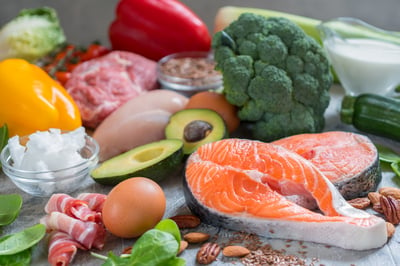FORCE's eXamining the Relevance of Articles for You (XRAY) program looks behind the headlines of cancer news to help you understand what the research means for you.
XRAY is a reliable source of hereditary cancer research-related news and information.
Learn more about the XRAY program
Categories Nutrition & Exercise
Study : A low-fat diet may decrease postmenopausal breast cancer deaths
Most relevant for: Post-menopausal women with no breast cancer diagnosis
Research reported at the 2019 annual meeting of the American Society of Clinical Oncology establishes a link between dietary fat intake and its impact on postmenopausal women’s risk of dying from breast cancer. (6/13/19)
Read More
Study : Do Vitamin B supplements alter breast cancer risk for women with BRCA mutations?
Most relevant for: High risk women with a BRCA1 or BRCA2 mutation
Vitamins are an essential part of our diet. Vitamin supplements are often used to improve general health. This study explores how vitamin B supplements may affect breast cancer risk in women with BRCA mutations. (5/17/19)
Read More
Relevance: Medium-High


Strength of Science: Medium-High


Research Timeline: Human Research


Study : Gardening improves health outcomes for breast cancer patients
Relevance: Medium-High


Strength of Science: Medium-High


Research Timeline: Human Research


Most relevant for: People diagnosed with breast cancer who would benefit from increased activity and from eating more vegetables
Research has shown that adopting a healthier lifestyle may improve overall health and outcomes for cancer survivors. This study looked at a 1-year home-based gardening intervention to increase activity and wellbeing among breast cancer survivors. (08/31/18)
Read More
Article : Interview with Angelina Jolie's doctor promotes meatless diet and scientific inaccuracies
Most relevant for:
Dr. Kristi Funk, Angelina Jolie's Hollywood breast surgeon, is promoting her new book about breast cancer. This article from the UK newspaper The Times includes an interview with Funk about her book, which proposes that diet is responsible for breast cancer. This XRAYS addresses scientific inaccuracies in this article. (8/7/18)
Read More
Guideline : American Heart Association examines the challenges of cardiovascular disease and breast cancer
Most relevant for: People diagnosed with breast cancer
Current breast cancer treatments can negatively affect cardiovascular health. Recently, the American Heart Association released its first scientific statement on cardiovascular disease and breast cancer. This statement includes a comprehensive overview of the prevalence of both diseases, shared risk factors, cardiotoxic effects of therapy and the prevention and treatment of cardiovascular disease in breast cancer patients. (5/2/18)
Read More
Relevance: Low


Strength of Science: Medium


Research Timeline: Animal Studies


Study : Is asparagus linked to breast cancer metastasis?
Relevance: Low


Strength of Science: Medium


Research Timeline: Animal Studies


Most relevant for: People diagnosed with breast cancer
A study published in the journal Nature shows that asparagine, a protein building block that takes its name from asparagus, promotes the spread of breast cancer in mice. The study by cancer experts from Britain, Canada and the U.S. investigated whether limiting the levels of asparagine in mice could reduce tumor metastasis. (3/2/18)
Read More
Study : Alcohol and breast cancer risk in African American women
Most relevant for: African American women who would like to lower their breast cancer risk
The link between alcohol intake and breast cancer is well known, but most studies have involved only White women. Recently, a large study of more than 22,000 African American (AA) women found that similar to White women, increased alcohol consumption is associated with a greater risk of breast cancer. (10/27/17)
Read More
Article : Can lifestyle changes impact breast cancer risk?
Most relevant for: Any woman concerned about her risk for breast cancer
A recent New York Times article shared how “adopting protective living habits” could help keep breast cancer “at bay”. While many of these lifestyle changes and strategies like not smoking, avoiding weight gain, reducing alcohol consumption, eating a heart-healthy diet, and increasing physical activity have been shown to reduce breast cancer risk, there are other risk factors that one cannot control such as having a BRCA or other mutation that significantly increases breast cancer risk. Importantly, no one strategy has been proven to totally eliminate breast cancer risk. However many of these approaches have overall health benefits. (9/21/2017)
Read More
Study : Diet during teen years and early adulthood is linked to breast cancer risk
Most relevant for: Adolescent and young adult women
During teen years, breast tissue grows rapidly in young girls and is more likely to be harmed by substances that are known to cause cancer. Few studies have looked at the relationship between diet during puberty and breast cancer risk. This study looks at how a woman’s diet during their teenage years and early adulthood is associated with breast cancer development later in life. (6/30/17)
Read More
Article : FDA busts myths of preventing and treating cancer by eating apricot kernels, herbs, and other ingredients
Most relevant for: People diagnosed with or concerned about their risk for cancer
Maggie Fox (NBC News) writes about a new FDA report that warns of 14 "fraudulent” cancer products claiming to either cure or treat cancer (1). The companies that sell these products claim that many of them also prevent cancer, but are they safe or effective? (6/26/17)
Read More